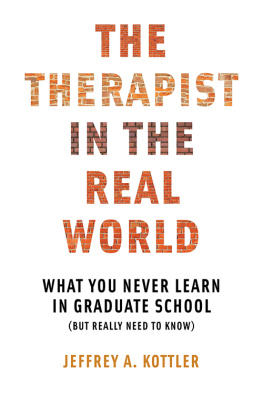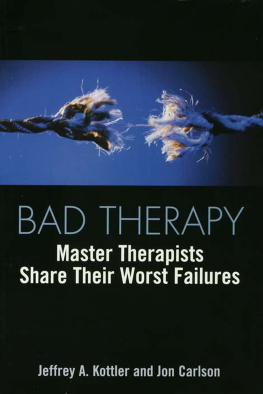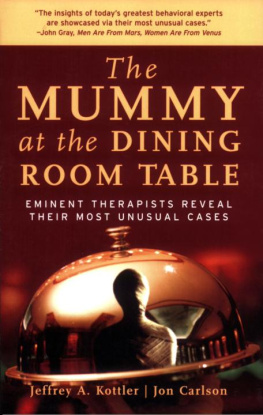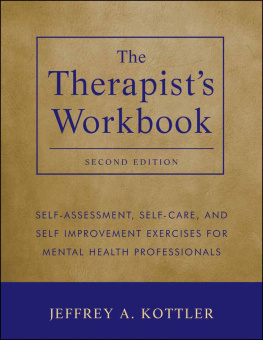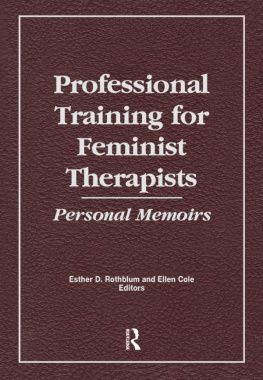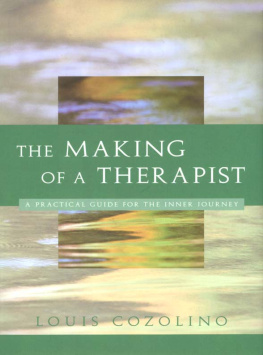
THE THERAPIST
IN THE
REAL WORLD
What You Never Learn
in Graduate School
(But Really Need to Know)
JEFFREY A. KOTTLER

W.W. Norton & Company
New York London
A NORTON PROFESSIONAL BOOK
Copyright 2015 by Jeffrey A. Kottler
Copyright 1997 by Jeffrey A. Kottler and Richard J. Hazler
Previous edition published as WHAT YOU NEVER LEARNED IN GRADUATE SCHOOL: A Survival Guide for Therapists
All rights reserved
For information about permission to reproduce selections from this book, write to Permissions, W. W. Norton & Company, Inc., 500 Fifth Avenue, New York, NY 10110
For information about special discounts for bulk purchases, please contact
W. W. Norton Special Sales at specialsales@wwnorton.com or 800-233-4830
Production manager: Christine Critelli
The Library of Congress has cataloged the printed edition as follows:
Kottler, Jeffrey A.
[What you never learned in graduate school]
The therapist in the real world : what you never learn in graduate school (but really need to know) / Jeffrey A. Kottler.
pages cm. (A Norton professional book)
Previous edition published in 1997 as: What you never learned in graduate school : a survival guide for therapists / Jeffrey A. Kottler and Richard J. Hazler.
Includes bibliographical references and index.
ISBN 978-0-393-71098-4 (pbk. : alk. paper)
ISBN 978-0-393-71099-1 (e-book)
1. PsychotherapyVocational guidance. 2. PsychotherapyPractice. 3. Psychotherapists. 4. Mental health counselors. 5. Mental health counseling. I. Title.
RC480.5.K683 2015
616.89'14023dc23
2015017864
W. W. Norton & Company, Inc.
500 Fifth Avenue, New York, N.Y. 10110
www.wwnorton.com
W. W. Norton & Company Ltd.
Castle House, 75/76 Wells Street, London W1T 3QT
Therapists have every right to expect that what they learn in graduate school will serve them well during a lifetime of service to others. Certainly some theories would be revised; even a few new ones would come to the forefront. Research and practice would continue to evolve, but at least in a form that was remotely recognizable to those who have been in the field for a while. Who could have ever imagined the kinds of changes that would take place in the last decade or two?
The truth of the matter is that the vast majority of therapists are quite satisfied with their graduate training, an outcome that has been steadily increasing as programs have added new components to meet upgraded standards of practice. Only about one in five therapists report that their education did not meet their expectations and left them inadequately prepared to practice in the real world.
However, even though graduates might claim that they were mostly content with their training, many therapists feel like they were not sufficiently prepared to deal with the new order of things, a world where managed care has reduced a degree of flexibility, where technological innovations now make it possible for us to do our work via alternative delivery systems. In all kinds of ways, there isand has always beena disconnection between the idealistic discourse of academia and the practical realities of working in the trenches.
There have been several major shifts evolving in the profession during recent years, sometimes not necessarily reflected in training programs. These include not only the transition of therapy from a profession to a business enterprise but also changes in (1) the ways we do treatment planning; (2) the paradigm shifts from single-theory allegiance to broad schools of thought; (3) the introduction of new conceptual models that are more responsive to contemporary needs of diverse clients; (4) the call for greater moral responsibility on the part of clinicians, especially as it applies to promoting social justice issues; (5) the demands for greater cultural and gender sensitivity; (6) the widespread use of computers, mobile devices, and other technology; (7) the resurgence of qualitative research methodologies; (8) the increased preference for medications to cure maladies, even with sometimes limited evidence for their effectiveness; and (9) the increased popularity of short-term interventions rather than long-term relationships. It is this last change that has been among the most dramatic, considering that many experienced therapists who completed their training years ago had been prepared to do a kind of work that is now becoming increasingly obsolete, at least for now. The tides may very well change once again as the population ages, enjoys more leisure time, and feels a greater interest in exploring the underlying meaning of a lifes journey.
Therapists and counselors are not only struggling to adapt to the changing landscape of the profession but also to a number of other demands that are directly related to professional and personal success. Graduate school couldnt possibly teach us all the skills and knowledge that we might need; the rest has been on our own, through trial and error, and via an underground network that provides both useful information and inaccurate advice. For example, we were not sufficiently warned that (1) there are negative side effects to being a therapist that can compromise our personal relationships, (2) life is not a multiple-choice exam where there is always one right answer, (3) even with advanced degrees we might still not be taken seriously by our families nor feel that we know enough to do our jobs, (4) our feelings of ineptitude may continue to persist, (5) there are personal reasons we chose to enter this field that we didnt fully confront, (6) we take ourselves far too seriously, (7) the answers to our most important questions are not always found in textbooks, (8) there is a lot of hypocrisy within our ranks and absurdity in what we do, and (9) we may never, ever feel good enough to do the job that we want to do. In addition, there are so many important things that we may not have been taught, such as how to get the most from supervision, recruit and train mentors to be most helpful, present talks in front of large audiences, and construct and implement a viable business plan for therapeutic practice, to mention just a few.
This book is written primarily for three groups of readers: (1) practitioners of social work, psychology, counseling, marital and family therapy, human services, psychiatry, psychiatric nursing, and other mental health disciplines; (2) advanced students in these professions; and (3) intelligent readers who are interested in learning about the inner world of therapy and the dramatic changes this field is undergoing. Never before in our history have so many new developments in research, theoretical constructions, technology, training methods, and diagnostic and treatment methods, not to mention changes in broader cultural trends and economic trends, occurred so quickly and require so many adaptations on the part of practitioners.
While this volume satisfies the demands of traditional scholarship, it is written in an accessible style that engages the reader on a personal level. Citations have been held to a minimum in favor of an authors voice that speaks directly to the reader about subjects that have often been ignored.
The focus throughout this book is on themes, issues, and critical areas that may not have been addressed in formal educational experiences. The first part is conceptual and provocative in nature, addressing seismic shifts in the field, the limits of professional training, and a review of the most critical areas for which practitioners are not prepared. The second part explores some interesting and neglected subjects that may not have been explicitly discussed during training years, including the ways our clients become our greatest teachers, the power of storytelling as the essence of our work, the factors that lead to creative breakthroughs during sessions, and the ways that deception plays a role in our helping relationships. The third part focuses on several practical areas where even experienced therapists need additional growth to maximize their potential: mastering new conceptual paradigms and cutting-edge technology, learning innovative forms of therapy responsive to the marketplace, preparing and delivering speeches and lectures, doing professional presentations, the process of mentoring and supervising therapists, publishing books and articles, dealing with organizational politics, sustaining a private practice, dealing with the media, transforming oneself through travel and risk taking, and planning for the future. Finally, we end by talking about the ways that the most satisfied and successful therapists are those who practice what they preach, applying to their own lives the most important lessons they teach to others.
Next page
